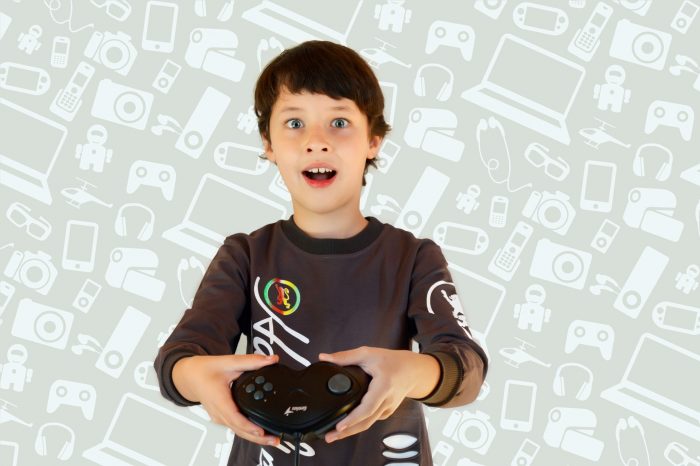It started for us a few years ago.
At first, I had an aversion to the game because of the violence—there are guns and “killing,” although it is in cartoon form. The kids say, “But there is no blood!” (Like other more violent games with actual blood-colored blood.)
My son started playing when he was about seven, after months of begging. I finally gave in because most of the other moms I knew had; I didn’t want him to “miss out.”
The Fortnite dances seemed to have started some weird phenomenon. Everywhere I would go, I would see some kid in line doing “the floss.” Then there are the skins, which kids will ask their parents redundantly for money to buy, which in reality are clothes and outfits for their Fortnite characters (that they also buy). And then they want to buy more dances, back-bling, and then gun skins. It seriously never ends.
I see myself turning a blind eye to the video game craze as my son talks on his mic to his neighborhood friends—even some new friends in other states.
My son stopped playing Fortnite last year when he realized how addicted he was. He saw how kids would actually get violent when being told to turn it off, and he realized he, too, felt somewhat on edge after playing. This game is fast-paced—building, shooting, dancing, killing. They get a ton of adrenaline from teaming up and doing these “build battles,” shooting competitions, and tournaments. It’s so much that they have a hard time “coming down” from the excitement of it all.
I know kids who will play until 1 a.m. and end up way too tired for school the next day. But they’ll still wake up and play some more before they have to catch the bus.
When COVID-19 hit, he asked if he could play again, and I succumbed because he wasn’t getting any outside socialization. The one benefit to this game (and possibly more games of this generation) is that the kids can all talk to each other while playing—it feels more social. However much I’d rather them discuss the latest book they’ve read, I also felt like they needed something to do; they needed to be connected.
I know kids my son’s age and younger who play Grand Theft Auto and Call of Duty, which I don’t allow. Those have an “M” (mature) rating while Fortnite has a “PEGI” (Pan European Game Information) rating of 12. Due to “Frequent scenes of mild violence. It is not suitable for persons under 12 years of age.”
Not to justify Fortnite as a suitable game at all. I despise all video games and don’t really understand the thrill—unless we could all go back to playing Super Mario Bros and save that damn princess!
Now there are “celebrity gamers” and YouTubers who make their profession out of playing Fortnite and other games while people (kids) watch and subscribe. There are also those who make Fortnite montages where they put clips from their gameplay to music and have the bass drop when the gunshot fires—they sync it. These content creators could have beyond a million subscribers.
I know we are in 2020 and want to do the best we can for our kids. Like every other parent, I worry that I am making a mistake in letting my children play certain games and eat certain foods—that I am not doing “enough” for them 24/7.
As parents, most of us do not want to harm our children, and if we know something is harming them, we will put an end to it. In the general school culture, I see many kids talking about Fortnite and chatting with friends about it at school. I also know a select few parent-friends who disagree with letting their kids play the game. Their kids do other things like Minecraft or other less controversial games.
This is a quote from my 5th-grade student pertaining to the game itself:
“When I think of Fortnite, I don’t really think of shooting. I think more about building and editing. I know a lot of people think it’s just shooting, but, really, if you’re good, you are actually good at building and editing and aiming too. But mostly it’s about your strategy, like how you play. Like if you’re in a tournament, you’re probably going to go passive and go for placement instead of going for kills unless you’re a pro, it just depends who you are playing with.”
When I do step back and think about it, I am glad he has something he can do with friends. Still, then I think of the kids who are potentially doing it hour after hour with no friends they actually know—how lonely and isolating Fortnite could be when parents aren’t actively asking about it. For us, my son plays in the family room; there is always an adult present (much to his demise, I’m sure). But many kids are playing in their bedrooms or basements with no adult interaction or supervision. I do worry about children at this age having the ability to “turn it off.”
Without parental limits, I find that kids and teens within the age range of 7-15 might have difficulty getting off the game independently. I also notice that if Fortnite is an option versus a board game, he will always choose the adrenaline-pumping video game’s stimulation with friends over a game of Sorry with the old parents. When the game is not an option, he will reluctantly read a book or do something else, but usually, it seems that playing Fortnite is the first-choice, preferred activity.
I know it is the same for me as an adult as I will go to read a book and end up on my phone forever and realize I intended to read. I literally have to force myself off my phone or social media outlet to read my less stimulating paper book.
I have done social media fasts in the past and realize how beneficial the time away from our addictions and afflictions can be. I generally want to know what other parents of this “Fortnite generation” think. I know that we will probably not all agree, but honestly, what is best for these kids who will soon be adults making the big decisions for our world? Will they have the decision-making skills they need? Will they be able to think quickly on their feet?
And the age-old question: If I let my kid play Fortnite now, will it ever end? Or will he be the 30-year-old in my basement still playing when all of his friends have gone on to live fulfilling lives? I hope and pray that my son can see beyond this “virtual world” and take real-life interactions over video game dances and skins, but only time will tell.

 Share on bsky
Share on bsky







Read 6 comments and reply